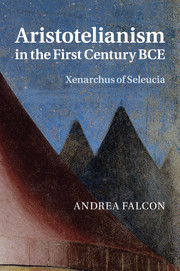Xenarchus: the man and his work
Published online by Cambridge University Press: 05 January 2012
Summary
Life
From Strabo we learn that Xenarchus was originally from Seleucia on the Calycadnus in Cilicia Tracheia, but that he spent most of his life away from home, teaching philosophy first in Alexandria, then in Athens, and finally in Rome [T1]. Strabo adds that he himself attended Xenarchus’ lectures. Finally, he names two people that must have been very important in Xenarchus’ life: Arius and the emperor Augustus. Arius is Arius of Alexandria, a philosopher who may have been the same person as the doxographer Arius Didymus and the Stoic philosopher listed on the index locupletior to Diogenes Laertius’ Lives. Arius was not only a friend, a teacher, and a confidant of Augustus; he was also a senior political advisor and a very influential member of Augustus’ most inner circle. Strabo seems to suggest that the friendship with Arius played a significant role in Xenarchus’ career. More directly, it is possible that Xenarchus owed his friendship with Augustus to Arius. On the basis of this biographical information, we can date Xenarchus’ activity to the second half of the first century bce.
Elsewhere Strabo tells us that he (Strabo) studied Aristotelian philosophy with Boethus, the Peripatetic philosopher native to Sidon. This piece of information has been combined with what Strabo says about Xenarchus to suggest that Boethus and Strabo were fellow students in Rome, and Xenarchus was their teacher. But the information in our possession does not justify this conclusion. In all probability, Strabo is saying that he was a student of Boethus, not that they were fellow students. Moreover, there is no evidence linking Boethus to Xenarchus, except what Alexander of Aphrodisias says in his Mantissa [T16]. There, Alexander names Boethus and Xenarchus as champions of the attempt to elaborate an Aristotelian doctrine of the first appropriate thing (prôton oikeion) out of what Aristotle says on love (philia). But this doctrinal agreement does not suffice to establish that Boethus studied with Xenarchus, or that Boethus and Xenarchus were personally close in any other way.
- Type
- Chapter
- Information
- Aristotelianism in the First Century BCEXenarchus of Seleucia, pp. 11 - 48Publisher: Cambridge University PressPrint publication year: 2011



